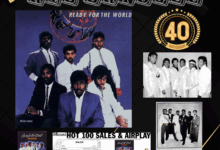Jon B Set To Release New Album “Comfortable Swagg” Tuesday, Valentines Day

The new album from Jon B — the Platinum-selling artist, who paved the way for the likes of Justin Timberlake and Robin Thicke – entitled, “Comfortable Swagg,” is being release digitally on Valentine’s Day!
The new single “Only One” is available for download on iTunes now (check out a preview of the video below)!
Although this impresario’s career has rubbed shoulders with legends from Luther Vandross to Babyface and from Tupac Shakur to Clive Davis, this marks his first totally independent venture through his own label Vibezelect Inc.
According to Jon, “It’s one thing to talk a good game, saying you got swagger, but it’s another to make people feel comfortable and inspired – that’s Comfortable Swagg!”
“Comfortable Swagg” (Vibezelect Inc.) reflects that Jon B is a family man now and that cradle of monogamy is a theme throughout his lyrics and sound. His journey through the crazy and wild music industry, that at most times represents anything but that, is documented in these songs.
“I’m changing with the times. I’m a grown man that knows about love and I’m not afraid to express it!” he says.
The album, entirely produced and written by Jon B., includes a feature by the Legendary DJ Quik on the track, “Fill Your Cup,”
Jon B has always been surrounded by music his entire life. He had an arsenal of original music material by the time he met Babyface Edmonds and then-wife Tracey Edmonds and launched his career on their Yab Yum Records (which morphed into Edmonds Record Group later on).
His debut album “Bonafide” went platinum and received Grammy nominations for Best Pop Collaboration with Vocals for the single, “Someone to Love,” a duet with Babyface that was a #5 hit on the Hot R&B/Hip-Hop Airplay charts.
The sophomore effort “Cool Relax” (Yab Yum/550 Music) went platinum and received several Billboard Music Award nominations including Top R&B Artist, Top Hot R&B Single for “They Don’t Know/Are U Still Down,” Top Hot R&B Singles Artist and a Soul Train Music Award nomination for Best Male Single. The single “They Don’t Know went Platinum and was a #1 R & B hit. The B-side of this single was “Are You Still Down,” and with a feature from the late great Tupac was #2 on the Hot R&B/Hip-Hop Singles and Tracks.
Jon B’s third album, “Pleasures U Like,” (Edmonds/Epic) made it to #3 on the R&B charts and the album went Gold. It is fondly remembered by its first single, the dance tune, “Don’t Talk.”
His fourth album “Stronger Everyday” (Sanctuary/E2 Music Group/Vibezelect/BMG) is a fan favorite which ventured down a path outside of usual Jon B fare with more dance tracks and collabos with the late ODB (AKA Dirt McGirt), Scarface, Babyface, Tupac, Beenieman and Tank. Following that came “Helpless Romantic” on the Arsenal/Vibezelect/Universal label which was produced entirely by Jon B
Jon B can go in any direction really whether it be R & B, or Hip Hop. In addition to Tupac he has worked with Nas and has been produced by Just Blaze (Jay-Z, DMX, Fabolous). So a genius like him usually just goes where the music in his mind and soul leads him. And now all are invited to delight in “Comfortable Swagg.”
[Pre-Order] “Comfortable Swagg” On iTunes February 14th!
Official Tracklisting!
Comfortable Swagg
Goin Down
Watch’n Now
Fill Your Cup
Make Up Love
Only One
Baby Maker
My Distraction
Drowning
Do U Miss Me
Your Karma Sutra
Amnesia









Jon B Set To Release New Album “Comfortable Swagg” Tuesday, Valentines Day | http://bit.ly/zusa5c
SAY WHAT?? Where is the promo I had no idea this was coming out what type of label is he on??? I will be purchasing:P
getting this!
i’m getting this, that is all i have to say lol.